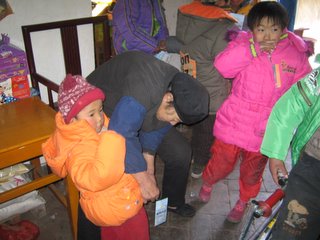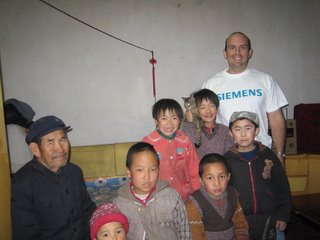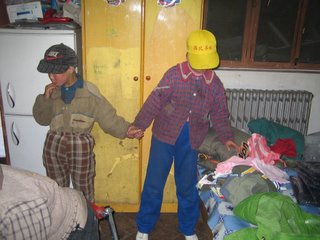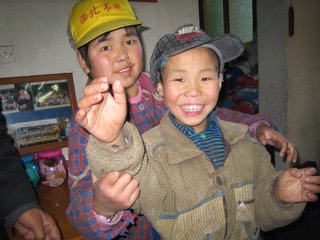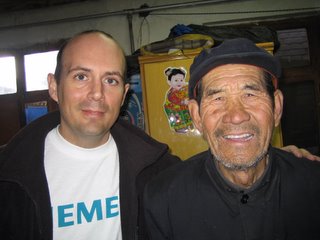Wednesday, November 09, 2005
Epilogue - When can I go again ?!
The trip is still to fresh in my past to reflect properly. I know it will take time before it all really sinks in.
There is no doubt that this trip was deeply meaningful for me and had great impact, as I hoped it would be. I suppose one of the things that really impressed me was the incredible amount of effort and heart put into this mission trip by my Chinese team-mates. I would have been grateful for their help with translation and getting around town alone. But each one of the people I met gave 100% of their heart and soul, to our cause. It was deeply touching and inspirational. My dedication is redoubled because of their assistance. I am deeply in their debt.
I know the meaning of this trip will no doubt change for me over time, but it is my sincere hope that this is only the beginning of new opportunities for me in helping children in orphanages.
I don't see how it can be the end for me, as my work with orphanages and children is a part of who I am. Our two daughters have shown me my purpose in life.
I will continue to do whatever I can. If anyone is reading this, and thinks they could use my help, please email me (I provided my contact information on the blog), I'll do whatever I can.
I'm still collating my pictures and the video I've taken. If anyone would be interested in seeing some video of my experience, please let me know (although it may take a while from the time of this post to get it all edited, I am still getting caught up with my daily life!)
Also, let me follow up on the needs as they stand for the places I visited:
Bengbu:
-150 children's (primary school) beds (we have already provided 12)
-50 cribs
-5 large A.C. units (which will also be used for heating) for common room areas
-15 individual room sized units (which will also be used for heating) for individual rooms
-There is need for highly specialized pediatric medical equipment needed for the new orphanage hospital
Please email me, or actually give me a call (I'd love to chat) (please email me for my phone number), and I can provide all the details, and give you a better feel of my experience. I know that actually talking to someone gives one a better feel for what can be done to help. If you are unable to provide for these items, please pass this note along (the internet is an INDISPENSABLE tool), to someone who might be able to help.
Lanzhou SWI:
- There are special needs surgeries that may be needed (I'm still awaiting feedback from the orphanage)
- Refrigerator
- A few small washers, or one large washer
- Airconditioning units
- books for the library
DingXi Mr. Chen's family:
- continued financial support for childcare for the family and living expenses which include clothing, heating, food, diapers.
- For those who are interested, we would like to work together to find a good long term solution for the Chen family, which might include the building of a new home for the Chen family, or moving to a new home.
Please contact me, or Packages of Hope to find out how you can help!
Siping SWI:
- A new playground
- Books for the children
- Financial support for Hannah's ASCCAC. Please contact me for details. As I mentioned in my posts, this center is receiving a great deal of positive attention due to the incredible success stories in childcare. This childcare is western-based, and does cost more to operate than traditional methods. However, the payoffs are being seen in the health and happiness of the children, especially those special needs children preparing for, or recovering from, critical life-saving surgeries. Hannah has great plans for her center, but it hinges on our support. To accomodate our needs, she is actively looking for a member of her staff with English language skill, so that they can readily communicate with English speaking people (in particular, charity groups wanting to come to China to help). This will come as added cost.
Again, please email me for details, or contact A Mother's Love (www.amotherslove.net), to find out more details on how you can help.
I wrote the following post to the Bengbu family yahoo egroup:
As I sat and watched TV, I saw the commercials that already show snowflakes and blare out the jingle of sleigh bells, indicated the start of the Holiday season, and the clever ploys to relieve families of their hard-earned money.
Big screen TVs... hi-tech razors...video games...
I smile.
I won't be getting any of those this year. I don't need them.
This Christmas will be low key for our family. This trip has indeed been a financial drain for us. But do not take pity on us. We will have fewer presents under the tree this year, but this year by far will be one of the best Holidays ever.
I am thankful for family.
I am thankful for a nice bed.
I am thankful for my health.
I am thankful for my children who I can kiss each night as they go to sleep.
Thanks to all of you, to all the heroes, for giving my life true meaning.

There is no doubt that this trip was deeply meaningful for me and had great impact, as I hoped it would be. I suppose one of the things that really impressed me was the incredible amount of effort and heart put into this mission trip by my Chinese team-mates. I would have been grateful for their help with translation and getting around town alone. But each one of the people I met gave 100% of their heart and soul, to our cause. It was deeply touching and inspirational. My dedication is redoubled because of their assistance. I am deeply in their debt.
I know the meaning of this trip will no doubt change for me over time, but it is my sincere hope that this is only the beginning of new opportunities for me in helping children in orphanages.
I don't see how it can be the end for me, as my work with orphanages and children is a part of who I am. Our two daughters have shown me my purpose in life.
I will continue to do whatever I can. If anyone is reading this, and thinks they could use my help, please email me (I provided my contact information on the blog), I'll do whatever I can.
I'm still collating my pictures and the video I've taken. If anyone would be interested in seeing some video of my experience, please let me know (although it may take a while from the time of this post to get it all edited, I am still getting caught up with my daily life!)
Also, let me follow up on the needs as they stand for the places I visited:
Bengbu:
-150 children's (primary school) beds (we have already provided 12)
-50 cribs
-5 large A.C. units (which will also be used for heating) for common room areas
-15 individual room sized units (which will also be used for heating) for individual rooms
-There is need for highly specialized pediatric medical equipment needed for the new orphanage hospital
Please email me, or actually give me a call (I'd love to chat) (please email me for my phone number), and I can provide all the details, and give you a better feel of my experience. I know that actually talking to someone gives one a better feel for what can be done to help. If you are unable to provide for these items, please pass this note along (the internet is an INDISPENSABLE tool), to someone who might be able to help.
Lanzhou SWI:
- There are special needs surgeries that may be needed (I'm still awaiting feedback from the orphanage)
- Refrigerator
- A few small washers, or one large washer
- Airconditioning units
- books for the library
DingXi Mr. Chen's family:
- continued financial support for childcare for the family and living expenses which include clothing, heating, food, diapers.
- For those who are interested, we would like to work together to find a good long term solution for the Chen family, which might include the building of a new home for the Chen family, or moving to a new home.
Please contact me, or Packages of Hope to find out how you can help!
Siping SWI:
- A new playground
- Books for the children
- Financial support for Hannah's ASCCAC. Please contact me for details. As I mentioned in my posts, this center is receiving a great deal of positive attention due to the incredible success stories in childcare. This childcare is western-based, and does cost more to operate than traditional methods. However, the payoffs are being seen in the health and happiness of the children, especially those special needs children preparing for, or recovering from, critical life-saving surgeries. Hannah has great plans for her center, but it hinges on our support. To accomodate our needs, she is actively looking for a member of her staff with English language skill, so that they can readily communicate with English speaking people (in particular, charity groups wanting to come to China to help). This will come as added cost.
Again, please email me for details, or contact A Mother's Love (www.amotherslove.net), to find out more details on how you can help.
I wrote the following post to the Bengbu family yahoo egroup:
As I sat and watched TV, I saw the commercials that already show snowflakes and blare out the jingle of sleigh bells, indicated the start of the Holiday season, and the clever ploys to relieve families of their hard-earned money.
Big screen TVs... hi-tech razors...video games...
I smile.
I won't be getting any of those this year. I don't need them.
This Christmas will be low key for our family. This trip has indeed been a financial drain for us. But do not take pity on us. We will have fewer presents under the tree this year, but this year by far will be one of the best Holidays ever.
I am thankful for family.
I am thankful for a nice bed.
I am thankful for my health.
I am thankful for my children who I can kiss each night as they go to sleep.
Thanks to all of you, to all the heroes, for giving my life true meaning.

American Special Chinese Children Assistance Center
I'll let the pictures do most of the talking for this post. 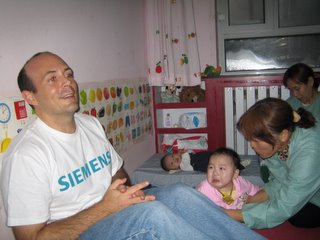

The magical few hours we spent in Hannah's center was a wonderful capstone to my mission trip. We presented supplies (clothes, blankets, financial support, and medicine) to the ASCCAC on behalf of IAAP and A Mother's Love. We also presented a plaque to Hannah for all her work with the children, on behalf of A Mother's Love.
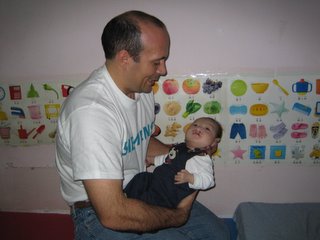
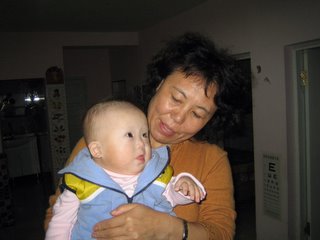 The floor plan was identical to the adjacent Deaf School, and had a unique "American"/western feel to it, as Hannah is taking a lot of her infant care directives from her supporters in America. The nannies hold the babies, and the apartment is filled with learning and therapy stations for the babies. While the location was a bit cramped, I was thoroughly impressed with the sophistication of the childcare equipment, and the cleanliness of the facility. It was a very self contained, all-inclusive childcare unit.
The floor plan was identical to the adjacent Deaf School, and had a unique "American"/western feel to it, as Hannah is taking a lot of her infant care directives from her supporters in America. The nannies hold the babies, and the apartment is filled with learning and therapy stations for the babies. While the location was a bit cramped, I was thoroughly impressed with the sophistication of the childcare equipment, and the cleanliness of the facility. It was a very self contained, all-inclusive childcare unit.
There are currently 6 nannies working at this facility, 4 on day shift, and 2 on night shift. The ASCCAC is taking care of 6 beautiful children at the moment, two from the Changchun SWI, and four from the Siping SWI. The two children from Changchun SWI have cleft palates, and are scheduled to receive corrective surgery in December under the Tomorrow Plan.

The four children from the Siping SWI:
- One is blind and mentally disabled. She is a year old now, but has not teeth and can respond a little to light, but cannot sit by herself
- One baby has spina bifida, and is scheduled to receive corrective surgery from Dr. Lazareff (as part of an American medical team visit) in December.
- One baby girl has Down's Syndrome
- The lone baby boy also is mentally handicapped and has limited use of his legs. He is a very happy and vocal baby!
I recorded Hannah on video where she introduced her staff and the babies.
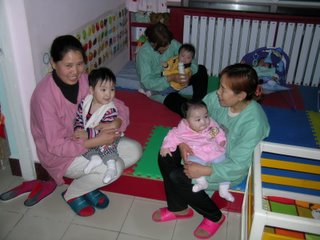
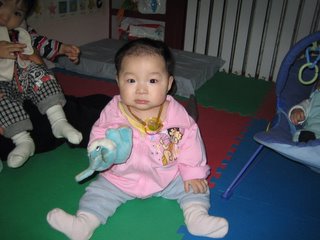
I paid the Siemens hearing aid representative, and then spent the remaining time just holding and playing with the babies.
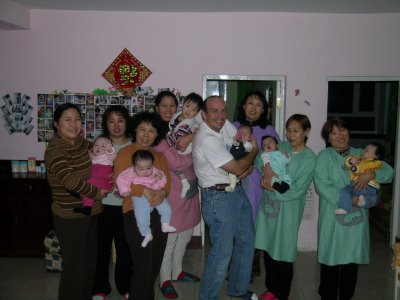
It was only after I had finished rocking one of the cleft palate children that I noticed Philip sitting alone in the corner of the room. He was holding the lone boy, and looked up at me with tears in his eyes.
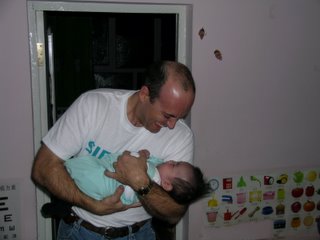 He told me how much this experienced had completely changed his life. He was so moved by the experience, and his heart was so deeply touched by all the people (adults and children alike) that he had met that day. This affected me as well, as I smiled broadly at him, realizing another kindred spirit had joined our passionate circle of souls who will always fight for the children.
He told me how much this experienced had completely changed his life. He was so moved by the experience, and his heart was so deeply touched by all the people (adults and children alike) that he had met that day. This affected me as well, as I smiled broadly at him, realizing another kindred spirit had joined our passionate circle of souls who will always fight for the children. 


The magical few hours we spent in Hannah's center was a wonderful capstone to my mission trip. We presented supplies (clothes, blankets, financial support, and medicine) to the ASCCAC on behalf of IAAP and A Mother's Love. We also presented a plaque to Hannah for all her work with the children, on behalf of A Mother's Love.

 The floor plan was identical to the adjacent Deaf School, and had a unique "American"/western feel to it, as Hannah is taking a lot of her infant care directives from her supporters in America. The nannies hold the babies, and the apartment is filled with learning and therapy stations for the babies. While the location was a bit cramped, I was thoroughly impressed with the sophistication of the childcare equipment, and the cleanliness of the facility. It was a very self contained, all-inclusive childcare unit.
The floor plan was identical to the adjacent Deaf School, and had a unique "American"/western feel to it, as Hannah is taking a lot of her infant care directives from her supporters in America. The nannies hold the babies, and the apartment is filled with learning and therapy stations for the babies. While the location was a bit cramped, I was thoroughly impressed with the sophistication of the childcare equipment, and the cleanliness of the facility. It was a very self contained, all-inclusive childcare unit.There are currently 6 nannies working at this facility, 4 on day shift, and 2 on night shift. The ASCCAC is taking care of 6 beautiful children at the moment, two from the Changchun SWI, and four from the Siping SWI. The two children from Changchun SWI have cleft palates, and are scheduled to receive corrective surgery in December under the Tomorrow Plan.

The four children from the Siping SWI:
- One is blind and mentally disabled. She is a year old now, but has not teeth and can respond a little to light, but cannot sit by herself
- One baby has spina bifida, and is scheduled to receive corrective surgery from Dr. Lazareff (as part of an American medical team visit) in December.
- One baby girl has Down's Syndrome
- The lone baby boy also is mentally handicapped and has limited use of his legs. He is a very happy and vocal baby!
I recorded Hannah on video where she introduced her staff and the babies.


I paid the Siemens hearing aid representative, and then spent the remaining time just holding and playing with the babies.

It was only after I had finished rocking one of the cleft palate children that I noticed Philip sitting alone in the corner of the room. He was holding the lone boy, and looked up at me with tears in his eyes.
 He told me how much this experienced had completely changed his life. He was so moved by the experience, and his heart was so deeply touched by all the people (adults and children alike) that he had met that day. This affected me as well, as I smiled broadly at him, realizing another kindred spirit had joined our passionate circle of souls who will always fight for the children.
He told me how much this experienced had completely changed his life. He was so moved by the experience, and his heart was so deeply touched by all the people (adults and children alike) that he had met that day. This affected me as well, as I smiled broadly at him, realizing another kindred spirit had joined our passionate circle of souls who will always fight for the children. 
The Siping School for the Deaf
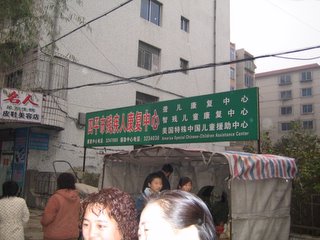
The Siping School for the Deaf, and the adjacent American Special Chinese Children Assistance Center was only 2 miles away from the Siping Orphanage (SWI), but was a world away in terms of the landscape. While the SWI was at the end of an unpaved road, amidst farming fields and large industrial yards, the ASCCAC was nestled nearly anonymously within the bustling downtown city streets and apartment buildings.
When the car came to a halt, I thought we were stopping to drop off one of the staff at their home. Hannah pointed proudly to a simple green sign, perched just above head height.
Hannah and Debbie led the way off the street and into a modest apartment complex courtyard where a man was busy at work repairing bicycle tires. We approached what appeared to be the stairwell entrance to the apartment complexes, but instead veered slightly to the left and entered a first floor doorway.
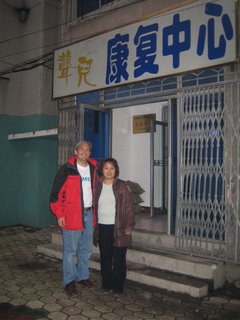 The aging plain yellowish concrete high rise (perhaps only 5 stories) were all cookie-cutter vertical replication of windows and walls. Only the varying laundry and window dressings set the windows apart, and tipped me off to the fact that these were apartment dwellings. The first floor window and door arrangement were the only differences to the structure, which was the indication that they did not serve as living spaces. However, this first floor was not adorned with flashy polish steel facades or neon signs, which were commonplace among shops that lined city streets.
The aging plain yellowish concrete high rise (perhaps only 5 stories) were all cookie-cutter vertical replication of windows and walls. Only the varying laundry and window dressings set the windows apart, and tipped me off to the fact that these were apartment dwellings. The first floor window and door arrangement were the only differences to the structure, which was the indication that they did not serve as living spaces. However, this first floor was not adorned with flashy polish steel facades or neon signs, which were commonplace among shops that lined city streets.Instead, the front doors to the Siping school for the deaf were plain yet dignified, and the entrance foyer had the appearance of being the tight entrance to a doctor’s office. A wall display showed a greeting in Chinese, and a short introduction to the facility. The floorplan of the facility looked to be that of an apartment with the walls slightly rearranged. I could see the children beyond, as they became increasingly nervous with the steady influx of “big people” into the facility.
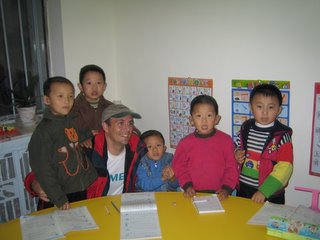 I know I must have been the terrible guest, as I shed my shoes, and ran to the floor to be with the kids. I’m sure Debbie had planned for a more formalized tour and a rehearsed speech, but I ruined all that with my distraction of these bright eyed children. I had walked in on a number of speech and hearing lessons, and the children and teachers were proud to show me what they had learned. The concentration, focus, and pride of student and teacher alike put a lump in my throat. Once again, I was in the presence of heroes.
I know I must have been the terrible guest, as I shed my shoes, and ran to the floor to be with the kids. I’m sure Debbie had planned for a more formalized tour and a rehearsed speech, but I ruined all that with my distraction of these bright eyed children. I had walked in on a number of speech and hearing lessons, and the children and teachers were proud to show me what they had learned. The concentration, focus, and pride of student and teacher alike put a lump in my throat. Once again, I was in the presence of heroes.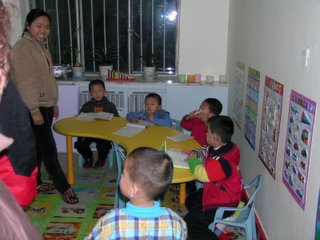
I
 sat engulfed by the curiosity of the children, as they were thrilled to see their pictures in my digital camera and my camcorder. I giggled and beamed with delight at the sight of a very cute girl with the most adorable ponytails. She was a little startled and suspicious of me (and I don’t blame her), but I still managed to get a few photos of her, suspicious gaze and all.
sat engulfed by the curiosity of the children, as they were thrilled to see their pictures in my digital camera and my camcorder. I giggled and beamed with delight at the sight of a very cute girl with the most adorable ponytails. She was a little startled and suspicious of me (and I don’t blame her), but I still managed to get a few photos of her, suspicious gaze and all. 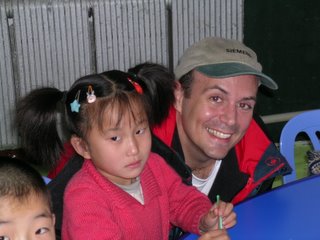
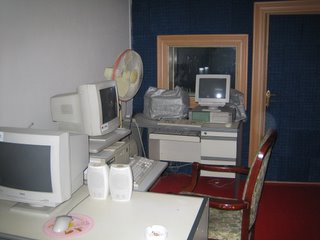 The staff did as best job as they could showing me around and showing me their state-of-the-art hearing test and diagnostic lab, donated by a Japanese organization, featuring a soundproof room and computers. Each room contained more delightful children, and I just couldn’t help myself but to wrap myself up in their smiles.
The staff did as best job as they could showing me around and showing me their state-of-the-art hearing test and diagnostic lab, donated by a Japanese organization, featuring a soundproof room and computers. Each room contained more delightful children, and I just couldn’t help myself but to wrap myself up in their smiles.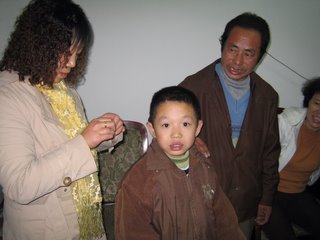 We made our way back to the front office, where a Siemens hearing aid representative had already arrived. Two vibrant boys were nervously standing in the office, surrounded by strangers, looking very confused. These were the boys that A Mother’s Love had sponsored new hearing aids for. One boy was only son of a farming family. He had 2 older sisters who did not have any hearing difficulty. The father was standing behind the boy, and was in tears of joy. His son was clearly disturbed with this, and looked at me with confusion as people around him smiled and held cameras ready to take our picture. Another boy was there with his grandmother, also from a farming family. She too was moved to deep gratitude, and pushing her small grandson towards me. Both family members were pushing the boys towards me, loudly shouting to have them say “Xie Xie” (thank you) or “Shou Shou” (“uncle”).
We made our way back to the front office, where a Siemens hearing aid representative had already arrived. Two vibrant boys were nervously standing in the office, surrounded by strangers, looking very confused. These were the boys that A Mother’s Love had sponsored new hearing aids for. One boy was only son of a farming family. He had 2 older sisters who did not have any hearing difficulty. The father was standing behind the boy, and was in tears of joy. His son was clearly disturbed with this, and looked at me with confusion as people around him smiled and held cameras ready to take our picture. Another boy was there with his grandmother, also from a farming family. She too was moved to deep gratitude, and pushing her small grandson towards me. Both family members were pushing the boys towards me, loudly shouting to have them say “Xie Xie” (thank you) or “Shou Shou” (“uncle”).
I was barely able to contain my tears, as I wished I could have told them all to stop. I was the one who was deeply indebted to these families. For they had given me, and had given all the people who so generously gave of their time, effort, and hard-earned money, in order to give back to a nation and to the children which had given us so much happiness. It was I who was receiving the greatest gift here, as my lip started to tremble.
The fervor of the small crowd started to reach a peak, and the children grew more and more panicked at the incessant taunts to embrace me.
I did not want this to be the way they remembered our generosity or our kindness, so I quickly gave them each a hug for the sake of the camera, much to their increasing fright.
Although they couldn’t understand me, through tear-welled eyes I held each of them by the shoulders and whispered a prayer, while they could only stare at my lips.
“Thank you, precious child, for giving my life meaning. Thank you for inspiring me, thank you for fighting, thank you for bringing happiness and hope to the world. You are surrounded by the love and prayers of caring people whose universe is held in your eyes.”
I think it was expected that I would stay until the hearing aids were fitted, but I didn’t want to stay there a minute longer, as I could see the boys’ chest begin to heave in hyperventilation of distress.
It was clear by the rejoicing throng surrounding the boys that their hearing would soon be assisted, and their lives, as well as the lives of those who cared for them and loved them each day were looking brighter.
I gave instruction to the Siemens representative to make sure she fitted the hearing aids to the family’s and Hannah’s satisfaction, and come next door to Hannah’s ASCCAC when she was done.
Only half putting on my shoes, I went with Hannah next door to where her tiny babies were under the watchful care of the nannies
A mile in his moccasins
My time on the 3rd floor was spent taking pictures at all angles, and pacing off the dimensions of the rooms. I wanted to make sure I had as much information as possible for the charity groups that were to come after me, so they would have a good idea for decorating and providing for medical/educational needs of the children.
Unfortunately we weren’t able to make it to see the children already residing in the old orphanage building.
We had a long afternoon yet ahead of us, which included lunch and a visit to Hannah’s facility in downtown Siping. After a few final photos for the Siemens newsletter, we were once again navigating the potholes of the unpaved road towards the center of town.
I perceived that the spirits of the orphanage staff were lifted at the notion of a restaurant meal. I could sympathize, as imagining the welcomed diversion from the monotony of everyday lunches.
I was becoming familiar with the faces of the staff, such as the orphanage director, Ms. Li, but I had to have Hannah remind me of the names and positions of the other staff members. There was Ms. Zhang Ying Ping, who was the head of the Siping Deaf School. Ms. Zhang Li Ping was a governmental officer. And there was a gentleman named Cin Ji Guang, who was the Dean of the People’s Committee of Siping, another communist party member.
A familiar wave of mild frustration passed over me as we sat down for a meal. I knew that this was a matter of course, and actually a valuable step in what we were trying to accomplish here. A meal was a chance to socialize. This socialization was very important in the Chinese culture. They WANTED to get to know me, and feel more comfortable. This was a necessary part of the process. As much as I just wanted to be with the children, to just spend time in the orphanage and making more observations, I knew that I had to endure this formality.
It was during this meeting, however, that I realized a bit of the impetuousness of my youth, and I learned a valuable lesson of the errors of my perception, all thanks to Hannah.
For as the luncheon wore on, instead of feeling like I was present at a luncheon of business formality, I discovered that the people around me were indeed very kindred spirits.
As I said, my first impression was of mild frustration. Mr. Cin broke out a pack of cigarettes, and offered me a beer, in true masculine fashion of Chinese cordiality. I accepted, as I regarded this Party member as a man who thought in terms of politics, and whom I initially assessed as being a bit cold-hearted to the cause of the children.
Waiters steadily brought trays of food into our rooms, as the toasts got underway. Ms. Li toasted us for our kindness and dedication to the children. I toasted Ms. Li for her fine work and her new orphanage. Both Ms. Zhang’s toasted their colleagues, then me. I toasted Philip for the fine work he had done for the children, and for Siemens. Philip, who was by this time thoroughly astounded and impressed by the demonstration of human spirit, toasted all of us back. I was impressed by Philip’s command of the conversation, and it was clear to me that his career would be long and impressive, given his performance thus far.
Beer, and then wine flowed, and we became more at ease. While this was not an approved practice for business in the USA (at least not for lunch), it was entirely appropriate here. It was, after all, an intimate meal, with old friends welcoming in new friends.
It was then that Hannah told me more about the people seated at the table. She told me about Li Ping (who we had given the English name “Diana”) and Ying Ping (who we had assigned the name “Debbie”). They were both grade school classmates with Hannah, and they remained close throughout these years. The details of their relationship were unimportant, but it was clear that they had seen good times and bad, and that their lives, although leading in very different directions, had still retained a bond of friendship, and a set of shared values. These commonalities brought them together to work together, even though at times they had differences of opinion.
But the most startling revelation came in Hannah’s praise of Mr. Cin (whom I named Antony, reminding me of a film character of an old B-movie Italian mobster flick).
I had judged Antony as a typical political bureaucrat. However, as I watched him smoke and schmooze with his colleagues around the table, Hannah told me that he was a pivotal person in the existence of the ASCCAC. He too was a childhood classmate of Hannah’s, and she and the other girlfriends had been surprised when his life took a turn into politics. Through a number of choices which turned out to cost him dearly in his personal life, he became a person of some influence in the local government.
Hannah told me how he basically put his career on the line at one point and stood singularly against the city council and demanded that Hannah’s center be given an operational charter. Hannah had told me how deeply he cared for the children.
At that moment I was humbled and ashamed for my judgment. “Never judge a man until you walk a mile in his moccasins”, my grandmother always used to say.
Following Hannah’s aside comments, I again toasted the group, thanking them for what they had done – “Luo Ye Gui Gen” – “Falling leaves return to the root”.
I bid goodbye to the wise and venerable orphanage director, Ms. Li (whom we had bestowed the English name “Helen”), and to my newly admired friend, Antony.
Hannah, Debbie, Diana, Philip, and I, sped off to the ASCCAC.
Unfortunately we weren’t able to make it to see the children already residing in the old orphanage building.
We had a long afternoon yet ahead of us, which included lunch and a visit to Hannah’s facility in downtown Siping. After a few final photos for the Siemens newsletter, we were once again navigating the potholes of the unpaved road towards the center of town.
I perceived that the spirits of the orphanage staff were lifted at the notion of a restaurant meal. I could sympathize, as imagining the welcomed diversion from the monotony of everyday lunches.
I was becoming familiar with the faces of the staff, such as the orphanage director, Ms. Li, but I had to have Hannah remind me of the names and positions of the other staff members. There was Ms. Zhang Ying Ping, who was the head of the Siping Deaf School. Ms. Zhang Li Ping was a governmental officer. And there was a gentleman named Cin Ji Guang, who was the Dean of the People’s Committee of Siping, another communist party member.
A familiar wave of mild frustration passed over me as we sat down for a meal. I knew that this was a matter of course, and actually a valuable step in what we were trying to accomplish here. A meal was a chance to socialize. This socialization was very important in the Chinese culture. They WANTED to get to know me, and feel more comfortable. This was a necessary part of the process. As much as I just wanted to be with the children, to just spend time in the orphanage and making more observations, I knew that I had to endure this formality.
It was during this meeting, however, that I realized a bit of the impetuousness of my youth, and I learned a valuable lesson of the errors of my perception, all thanks to Hannah.
For as the luncheon wore on, instead of feeling like I was present at a luncheon of business formality, I discovered that the people around me were indeed very kindred spirits.
As I said, my first impression was of mild frustration. Mr. Cin broke out a pack of cigarettes, and offered me a beer, in true masculine fashion of Chinese cordiality. I accepted, as I regarded this Party member as a man who thought in terms of politics, and whom I initially assessed as being a bit cold-hearted to the cause of the children.
Waiters steadily brought trays of food into our rooms, as the toasts got underway. Ms. Li toasted us for our kindness and dedication to the children. I toasted Ms. Li for her fine work and her new orphanage. Both Ms. Zhang’s toasted their colleagues, then me. I toasted Philip for the fine work he had done for the children, and for Siemens. Philip, who was by this time thoroughly astounded and impressed by the demonstration of human spirit, toasted all of us back. I was impressed by Philip’s command of the conversation, and it was clear to me that his career would be long and impressive, given his performance thus far.
Beer, and then wine flowed, and we became more at ease. While this was not an approved practice for business in the USA (at least not for lunch), it was entirely appropriate here. It was, after all, an intimate meal, with old friends welcoming in new friends.
It was then that Hannah told me more about the people seated at the table. She told me about Li Ping (who we had given the English name “Diana”) and Ying Ping (who we had assigned the name “Debbie”). They were both grade school classmates with Hannah, and they remained close throughout these years. The details of their relationship were unimportant, but it was clear that they had seen good times and bad, and that their lives, although leading in very different directions, had still retained a bond of friendship, and a set of shared values. These commonalities brought them together to work together, even though at times they had differences of opinion.
But the most startling revelation came in Hannah’s praise of Mr. Cin (whom I named Antony, reminding me of a film character of an old B-movie Italian mobster flick).
I had judged Antony as a typical political bureaucrat. However, as I watched him smoke and schmooze with his colleagues around the table, Hannah told me that he was a pivotal person in the existence of the ASCCAC. He too was a childhood classmate of Hannah’s, and she and the other girlfriends had been surprised when his life took a turn into politics. Through a number of choices which turned out to cost him dearly in his personal life, he became a person of some influence in the local government.
Hannah told me how he basically put his career on the line at one point and stood singularly against the city council and demanded that Hannah’s center be given an operational charter. Hannah had told me how deeply he cared for the children.
At that moment I was humbled and ashamed for my judgment. “Never judge a man until you walk a mile in his moccasins”, my grandmother always used to say.
Following Hannah’s aside comments, I again toasted the group, thanking them for what they had done – “Luo Ye Gui Gen” – “Falling leaves return to the root”.
I bid goodbye to the wise and venerable orphanage director, Ms. Li (whom we had bestowed the English name “Helen”), and to my newly admired friend, Antony.
Hannah, Debbie, Diana, Philip, and I, sped off to the ASCCAC.
Tuesday, November 08, 2005
Visiting the new Siping SWI
As we finished our conversation and donned our jackets to walk towards the new orphanage, Hannah described the efforts to make her ASCCAC an integral part of the SWI.
Hannah had been wrestling with how to expand her extremely successful child care center. Currently, Hannah's ASCCAC is located in central Siping. Success stories of the special needs children in her care was achieving higher visibility.
Given that the two facilities were so far apart from one another, Hannah and Ms. Li decided to move the ASCCAC to the Siping orphanage. But while that will solve some problems, it will bring about new complications.
The SWI has only one vehicle, a 10 year old mini-SUV, pampered to extend its lifespan. Any children requiring hospital visits or emergency care will have a more difficult time in getting quickly to a hospital. A charity group, though, is trying to raise funds for a new van. The nannies will have an additional distance to travel to work at the SWI, and they will probably have to walk or bike ride down this unpaved road. In addition, there will be more children for Hannah to look after, which will require more nannies. So now she is faced with additional labor
costs. She would really like to have a nanny on staff with advanced medical qualifications. If she spoke English she would be of good use when future charity groups or medical missions visit the Siping SWI.
My eyebrows furrowed as I contemplated overcoming these hurdles. But as we left the building into the open air, Hannah smiled and tugged at my arm, and in a high happy voice shouted, "Look! Look! Isn't it wonderful?" There were smiles all around as we caught sight of the rooftop of the new Cinderella castle structure of the new orphanage.
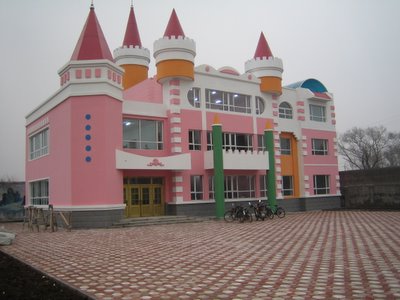 We passed through the building that housed the elderly, walking down a long hallway lined with doors. Some of the elderly residents, shuffling along, looked up and gave us a warm or surprised smile. The courtyard and the new orphanage appeared before us like a bright centerpiece of an old table. The bright orange-red bricks of the front courtyard looked only hours old. Cameras clicked away and hammers pounded inside the building, construction still underway. The building would be finished soon, but Hannah was going to hold off moving her facility. The brutal winter was fast approaching, and she did not want move the children in the cold or risk any heating malfunction in the new buildings. Instead, she intended to make the move in spring of 2006.
We passed through the building that housed the elderly, walking down a long hallway lined with doors. Some of the elderly residents, shuffling along, looked up and gave us a warm or surprised smile. The courtyard and the new orphanage appeared before us like a bright centerpiece of an old table. The bright orange-red bricks of the front courtyard looked only hours old. Cameras clicked away and hammers pounded inside the building, construction still underway. The building would be finished soon, but Hannah was going to hold off moving her facility. The brutal winter was fast approaching, and she did not want move the children in the cold or risk any heating malfunction in the new buildings. Instead, she intended to make the move in spring of 2006.
The new Siping orphanage will accommodate around 100 children. There are three floors with five or six rooms each. The first floor is for older children. The second floor is designated for infants, and the third will be allocated to Hannah's American Special Chinese Children Assistance Center, accommodating perhaps 20 children. Although the exterior of the building was complete, the interior areas were still full of construction and finishing equipment.
As we ascended the stairs to the third floor, Philip (Chen Mo) was already impressed with the orphanage staff and with the efforts that were being made here. He asked why I was taking so many pictures.
 I told him that we're only the beginning here. There's many families and charities who want to make a difference here, and are just trying to find out what they can do to help. We're here to collect the data, for people like 'A Mother's Love' and others so they can make some big strides
I told him that we're only the beginning here. There's many families and charities who want to make a difference here, and are just trying to find out what they can do to help. We're here to collect the data, for people like 'A Mother's Love' and others so they can make some big strides
in the quality of life for the children here.
Philip was clearly impressed. He slowly began to see my heart, and the hearts of Hannah, Ms. Li, and the other staff. Our passion was here, our drive was for the children, and we were here for the long haul.
 Philip and I took pictures in front of the refrigerator and the washer, still in their boxes. We were very proud to represent Siemens, but Philip now understood what I already knew.
Philip and I took pictures in front of the refrigerator and the washer, still in their boxes. We were very proud to represent Siemens, but Philip now understood what I already knew.
This was just the beginning.
These gracious gifts energized us, much like the new orphanage must have energized the staff there. There was a mountain of work yet to be done, with huge obstacles before us. But our hearts were ready for it, and our passion for the children drove us onward.
Hannah had been wrestling with how to expand her extremely successful child care center. Currently, Hannah's ASCCAC is located in central Siping. Success stories of the special needs children in her care was achieving higher visibility.
Given that the two facilities were so far apart from one another, Hannah and Ms. Li decided to move the ASCCAC to the Siping orphanage. But while that will solve some problems, it will bring about new complications.
The SWI has only one vehicle, a 10 year old mini-SUV, pampered to extend its lifespan. Any children requiring hospital visits or emergency care will have a more difficult time in getting quickly to a hospital. A charity group, though, is trying to raise funds for a new van. The nannies will have an additional distance to travel to work at the SWI, and they will probably have to walk or bike ride down this unpaved road. In addition, there will be more children for Hannah to look after, which will require more nannies. So now she is faced with additional labor
costs. She would really like to have a nanny on staff with advanced medical qualifications. If she spoke English she would be of good use when future charity groups or medical missions visit the Siping SWI.
My eyebrows furrowed as I contemplated overcoming these hurdles. But as we left the building into the open air, Hannah smiled and tugged at my arm, and in a high happy voice shouted, "Look! Look! Isn't it wonderful?" There were smiles all around as we caught sight of the rooftop of the new Cinderella castle structure of the new orphanage.
 We passed through the building that housed the elderly, walking down a long hallway lined with doors. Some of the elderly residents, shuffling along, looked up and gave us a warm or surprised smile. The courtyard and the new orphanage appeared before us like a bright centerpiece of an old table. The bright orange-red bricks of the front courtyard looked only hours old. Cameras clicked away and hammers pounded inside the building, construction still underway. The building would be finished soon, but Hannah was going to hold off moving her facility. The brutal winter was fast approaching, and she did not want move the children in the cold or risk any heating malfunction in the new buildings. Instead, she intended to make the move in spring of 2006.
We passed through the building that housed the elderly, walking down a long hallway lined with doors. Some of the elderly residents, shuffling along, looked up and gave us a warm or surprised smile. The courtyard and the new orphanage appeared before us like a bright centerpiece of an old table. The bright orange-red bricks of the front courtyard looked only hours old. Cameras clicked away and hammers pounded inside the building, construction still underway. The building would be finished soon, but Hannah was going to hold off moving her facility. The brutal winter was fast approaching, and she did not want move the children in the cold or risk any heating malfunction in the new buildings. Instead, she intended to make the move in spring of 2006.The new Siping orphanage will accommodate around 100 children. There are three floors with five or six rooms each. The first floor is for older children. The second floor is designated for infants, and the third will be allocated to Hannah's American Special Chinese Children Assistance Center, accommodating perhaps 20 children. Although the exterior of the building was complete, the interior areas were still full of construction and finishing equipment.
As we ascended the stairs to the third floor, Philip (Chen Mo) was already impressed with the orphanage staff and with the efforts that were being made here. He asked why I was taking so many pictures.
 I told him that we're only the beginning here. There's many families and charities who want to make a difference here, and are just trying to find out what they can do to help. We're here to collect the data, for people like 'A Mother's Love' and others so they can make some big strides
I told him that we're only the beginning here. There's many families and charities who want to make a difference here, and are just trying to find out what they can do to help. We're here to collect the data, for people like 'A Mother's Love' and others so they can make some big stridesin the quality of life for the children here.
Philip was clearly impressed. He slowly began to see my heart, and the hearts of Hannah, Ms. Li, and the other staff. Our passion was here, our drive was for the children, and we were here for the long haul.
 Philip and I took pictures in front of the refrigerator and the washer, still in their boxes. We were very proud to represent Siemens, but Philip now understood what I already knew.
Philip and I took pictures in front of the refrigerator and the washer, still in their boxes. We were very proud to represent Siemens, but Philip now understood what I already knew.This was just the beginning.
These gracious gifts energized us, much like the new orphanage must have energized the staff there. There was a mountain of work yet to be done, with huge obstacles before us. But our hearts were ready for it, and our passion for the children drove us onward.
Monday, November 07, 2005
Heading to Siping SWI - Hannah's dedication
As with my previous two locations, our team (Hannah and I at the moment) plotted how to best utilize our time on the following day, in order to get the most amount done. Fortunately, we had done a lot of pre-planning. Countless emails and phone calls ahead of time lined up a lot of our activities for the next day.
We were first scheduled to meet with a local Siemens representative to sign some paperwork. Siemens had generously donated a brand new washer and refrigerator to Hannah’s ASCCAC. We had also called ahead to the orphanage director, in order to coordinate a meeting and a tour of the new Siping Orphanage. We had also coordinated a meeting with the local Siemens hearing aid representative, as we were donating two hearing aids to needy children from the Siping school for the deaf.
This amount of coordination was necessary, as the Siping orphanage was about 1.5 hours by car drive from Changchun. The Siping orphanage is located away from the Siping city center. Hannah’s ASCCAC is located near the Siping City center, adjacent to the Siping SWI school for the deaf.
Hannah, her husband Frank, and I, spent a lovely dinner together where I mostly squawked due to my ruined vocal chords. We had fun catching up on daughters (two of my most favorite topics of conversation), and Hannah brought me up to speed on many of the details she had been up against with the orphanage. I felt very privileged to be part of such conversation, as the Chinese tend to be polite and considerate to a fault with guests, and rarely do I have the opportunity to understand the deep intricacies of business in China. To be sure Hannah was no businesswoman, for she felt much more at ease holding babies and helping parents unite with their forever children. But as her scope and operation increased, politics and business became part of the territory.
I commented to her, just as she said the same to me, that it was indeed tragic that she had to depart from what was her greatest pleasure, and what really drove her, which was caring for children. But I explained to her that she had a talent, which very few people actually possessed. She had developed it through backbreaking and selfless work and dedication. An unfortunate byproduct of this talent and skill is the responsibility of actually using it, even though it meant from a higher and higher level of visibility. No matter how much headache were caused by the administration of the ASCCAC, I encouraged her to press on.
At times she told me that she didn’t feel like she was qualified, or doing as good of a job as she should have been doing. At times she felt like things were going in the opposite direction of where she wanted to go, or felt like it needed to go.
I, however, saw the same thing that Frank saw in the eyes of our dear Hannah. I told her, “you’re doing a GREAT job, Hannah. You ARE making a difference. Don’t give up. We believe in you. I know it’s tough, but you can’t give up. And I know you won’t give up. You are driven by a Higher Hand, and I know you will not refuse instruction. We will lift you up. We sing your praises and send you prayers of support. You will always have my support.”
Frank smiled, and I gave him a wink. He indeed is a very lucky man.
Going to sleep that night was a bit of a relief for me. Even though my vocal chords were in terrible condition, I was seeing the end of the tunnel for this trip for me. I was beginning to feel my age, as I realized that I had been pushing myself hard during this trip. The 4 to 5 hour/night sleep time and long hard days were finally catching up to me. I looked to my poor bags with a bit of a smile. I had separated the final bit of supplies for the Siping orphanage and the ASCCAC. It wasn’t a lot, but was perhaps 25 kilos (50 odd pounds) of diaper crèmes, antibiotic crèmes, clothes, blankets, and supplies. I had also brought along some books for Hannah. My luggage breathed a sigh of relief at this relinquished weight.
I awoke in the morning refreshed and ready for action.
After another delicious Chinese style breakfast of dimsum, fresh vegetables and noodles, I went to the lobby.
It was there that I was introduced to Chen Mo (English name - Philip), the business Administration Officer for the Siemens office in Changchun.
 I’ll let the cat out of the bag now that while at first I thought Chen was going to be just a minor part of this mission, it turned out that he was to become a wonderful friend, and such a beautiful part of this story. Indeed, I think he felt the same way about the experience, which made it even more special.
I’ll let the cat out of the bag now that while at first I thought Chen was going to be just a minor part of this mission, it turned out that he was to become a wonderful friend, and such a beautiful part of this story. Indeed, I think he felt the same way about the experience, which made it even more special.
Chen Mo is a very handsome 25 year old Changchun native - tall, slim, and with chiseled movie star good looks. He spoke nearly flawless English, and kept on apologizing for making minor grammatical errors. Like so many other dedicated English speaking Chinese people, I had to remind him that I knew many Americans that made more grammatical errors while speaking than he did, and begged him not to worry about it.
He appeared in the lobby a bit tired and disinterested, which was to be a marked difference from how the end of this day would turn out for him.
It turned out that Chen Mo was a diamond in the rough, whose life was to be changed forever by the few short hours that lay ahead of him. It was magical to see his eyes being opened.
We exchanged business cards, and he asked me some questions about where I worked, no doubt to further validate that the donation was being used as I had asked for via emails to Siemens Beijing corporate headquarters months earlier.
After taking a cellphone call, he informed us that the new refrigerator and washer had just been delivered to the Siping orphanage. He was to accompany us to get a few pictures for the Siemens corporate PR department.
As we wound our way out of town, we talked in the car, and I updated him on my previous missions in Bengbu and Lanzhou. I tried to talk in a whisper, saving my voice as best I could for meeting with the orphanage director.
Changchun disappeared behind us, and it was like we stepped out of a door into another world. Changchun is complete with skyscrapers, 5-star hotels, Wal-Marts, McDonalds, and all the other trappings and access of an ultramodern western-style city. However, just a mere dozen miles outside of town, and the unimaginative dull grey and yellowing brick walls of old China dominate the landscape. In Hannah’s words, Siping has a long way to go to catch up with the rest of China. It is a mining and industrial town, and has been resistant to change, for complex reasons which can only be understood by politicians.
Unkempt, one-story garage-style shops lined the road outside of Siping as we made our way to the orphanage.
Hannah and I contemplated the lack of civilization as we were accustomed to it, as the citizens dressed in dark blue and grey went about their daily business on this cold and cloudy autumn day whizzed by.
An Orlando charity group, A Mother’s Love (www.amotherslove.net), was now involved in assisting the ASCCAC, and we contemplated the logistics of American representatives from this, or other charities, journeying to this place on a short term basis to assist the orphanage workers or to do other work for the children.
The logistics of the operation were further complicated as we turned off a paved avenue onto a dirt road that led off in a straight line towards the horizon.
 As it turned out, the off-road experience went on for only about ¾ of a mile. However, the unchanging yellowing walls of various industry business, along with the pothole marked road, made the trip seem endless.
As it turned out, the off-road experience went on for only about ¾ of a mile. However, the unchanging yellowing walls of various industry business, along with the pothole marked road, made the trip seem endless.
We finally arrived at a small break in the wall, which signaled the entrance into the Siping SWI (
located at N 43' 10.834", E124' 24.119", and BTW, "Siping" translates in English to "Heroic City"). The orphanage complex is made up of a few buildings. Beyond the entrance guard house is an administration building, which looks fairly new. Behind the Admin building there is a long, one-story building which houses the elderly residents of the SWI.
We were guided into a large reception room where we were greeted by the orphanage director, Ms. Li.
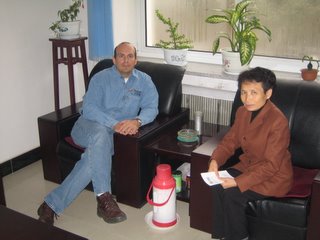 Hannah and Ms. Li greeted each other like the old girl friends they were. Absent was the formality I had witnessed in previous introductions to the orphanage staff. Hannah had briefed me beforehand on this director. She was a diminutive woman, standing a little under 5 feet. But she was tough as nails.
Hannah and Ms. Li greeted each other like the old girl friends they were. Absent was the formality I had witnessed in previous introductions to the orphanage staff. Hannah had briefed me beforehand on this director. She was a diminutive woman, standing a little under 5 feet. But she was tough as nails.
Hannah told me that she had previously one of two administrators in the Chinese version of a homeless shelter. The homeless shelter often housed people running from the law, and several administrators couldn’t take the pressure. But Ms. Li ran it successfully. She had been in her position for a little over 4 years, and while she greeted Hannah warmly and informally, her entire demeanor just oozed capability, confidence, and authority. Hannah had told me about their long history together, of all the children they fought for, and those several cases where the children didn’t make it. Their bond was forged by battle over the years, and they had seen sorrow together and they had seen success together. It was clear that there was a firm bond of trust that existed between the two.
Unfortunately, my voice had not improved at all, and I was only able to squawk out a brief introduction. Hannah did most of the talking, and Chen Mo, who had never before set foot in an orphanage, also respectfully entered the conversation.
Hannah and Ms. Li engaged in lively conversation as I sipped my tea.
I showed Ms. Li some pictures of my children which she separated into neat piles.
This was one sharp lady!
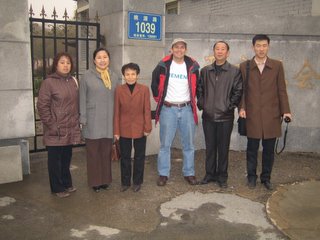
We were first scheduled to meet with a local Siemens representative to sign some paperwork. Siemens had generously donated a brand new washer and refrigerator to Hannah’s ASCCAC. We had also called ahead to the orphanage director, in order to coordinate a meeting and a tour of the new Siping Orphanage. We had also coordinated a meeting with the local Siemens hearing aid representative, as we were donating two hearing aids to needy children from the Siping school for the deaf.
This amount of coordination was necessary, as the Siping orphanage was about 1.5 hours by car drive from Changchun. The Siping orphanage is located away from the Siping city center. Hannah’s ASCCAC is located near the Siping City center, adjacent to the Siping SWI school for the deaf.
Hannah, her husband Frank, and I, spent a lovely dinner together where I mostly squawked due to my ruined vocal chords. We had fun catching up on daughters (two of my most favorite topics of conversation), and Hannah brought me up to speed on many of the details she had been up against with the orphanage. I felt very privileged to be part of such conversation, as the Chinese tend to be polite and considerate to a fault with guests, and rarely do I have the opportunity to understand the deep intricacies of business in China. To be sure Hannah was no businesswoman, for she felt much more at ease holding babies and helping parents unite with their forever children. But as her scope and operation increased, politics and business became part of the territory.
I commented to her, just as she said the same to me, that it was indeed tragic that she had to depart from what was her greatest pleasure, and what really drove her, which was caring for children. But I explained to her that she had a talent, which very few people actually possessed. She had developed it through backbreaking and selfless work and dedication. An unfortunate byproduct of this talent and skill is the responsibility of actually using it, even though it meant from a higher and higher level of visibility. No matter how much headache were caused by the administration of the ASCCAC, I encouraged her to press on.
At times she told me that she didn’t feel like she was qualified, or doing as good of a job as she should have been doing. At times she felt like things were going in the opposite direction of where she wanted to go, or felt like it needed to go.
I, however, saw the same thing that Frank saw in the eyes of our dear Hannah. I told her, “you’re doing a GREAT job, Hannah. You ARE making a difference. Don’t give up. We believe in you. I know it’s tough, but you can’t give up. And I know you won’t give up. You are driven by a Higher Hand, and I know you will not refuse instruction. We will lift you up. We sing your praises and send you prayers of support. You will always have my support.”
Frank smiled, and I gave him a wink. He indeed is a very lucky man.
Going to sleep that night was a bit of a relief for me. Even though my vocal chords were in terrible condition, I was seeing the end of the tunnel for this trip for me. I was beginning to feel my age, as I realized that I had been pushing myself hard during this trip. The 4 to 5 hour/night sleep time and long hard days were finally catching up to me. I looked to my poor bags with a bit of a smile. I had separated the final bit of supplies for the Siping orphanage and the ASCCAC. It wasn’t a lot, but was perhaps 25 kilos (50 odd pounds) of diaper crèmes, antibiotic crèmes, clothes, blankets, and supplies. I had also brought along some books for Hannah. My luggage breathed a sigh of relief at this relinquished weight.
I awoke in the morning refreshed and ready for action.
After another delicious Chinese style breakfast of dimsum, fresh vegetables and noodles, I went to the lobby.
It was there that I was introduced to Chen Mo (English name - Philip), the business Administration Officer for the Siemens office in Changchun.
 I’ll let the cat out of the bag now that while at first I thought Chen was going to be just a minor part of this mission, it turned out that he was to become a wonderful friend, and such a beautiful part of this story. Indeed, I think he felt the same way about the experience, which made it even more special.
I’ll let the cat out of the bag now that while at first I thought Chen was going to be just a minor part of this mission, it turned out that he was to become a wonderful friend, and such a beautiful part of this story. Indeed, I think he felt the same way about the experience, which made it even more special.Chen Mo is a very handsome 25 year old Changchun native - tall, slim, and with chiseled movie star good looks. He spoke nearly flawless English, and kept on apologizing for making minor grammatical errors. Like so many other dedicated English speaking Chinese people, I had to remind him that I knew many Americans that made more grammatical errors while speaking than he did, and begged him not to worry about it.
He appeared in the lobby a bit tired and disinterested, which was to be a marked difference from how the end of this day would turn out for him.
It turned out that Chen Mo was a diamond in the rough, whose life was to be changed forever by the few short hours that lay ahead of him. It was magical to see his eyes being opened.
We exchanged business cards, and he asked me some questions about where I worked, no doubt to further validate that the donation was being used as I had asked for via emails to Siemens Beijing corporate headquarters months earlier.
After taking a cellphone call, he informed us that the new refrigerator and washer had just been delivered to the Siping orphanage. He was to accompany us to get a few pictures for the Siemens corporate PR department.
As we wound our way out of town, we talked in the car, and I updated him on my previous missions in Bengbu and Lanzhou. I tried to talk in a whisper, saving my voice as best I could for meeting with the orphanage director.
Changchun disappeared behind us, and it was like we stepped out of a door into another world. Changchun is complete with skyscrapers, 5-star hotels, Wal-Marts, McDonalds, and all the other trappings and access of an ultramodern western-style city. However, just a mere dozen miles outside of town, and the unimaginative dull grey and yellowing brick walls of old China dominate the landscape. In Hannah’s words, Siping has a long way to go to catch up with the rest of China. It is a mining and industrial town, and has been resistant to change, for complex reasons which can only be understood by politicians.
Unkempt, one-story garage-style shops lined the road outside of Siping as we made our way to the orphanage.
Hannah and I contemplated the lack of civilization as we were accustomed to it, as the citizens dressed in dark blue and grey went about their daily business on this cold and cloudy autumn day whizzed by.
An Orlando charity group, A Mother’s Love (www.amotherslove.net), was now involved in assisting the ASCCAC, and we contemplated the logistics of American representatives from this, or other charities, journeying to this place on a short term basis to assist the orphanage workers or to do other work for the children.
The logistics of the operation were further complicated as we turned off a paved avenue onto a dirt road that led off in a straight line towards the horizon.
 As it turned out, the off-road experience went on for only about ¾ of a mile. However, the unchanging yellowing walls of various industry business, along with the pothole marked road, made the trip seem endless.
As it turned out, the off-road experience went on for only about ¾ of a mile. However, the unchanging yellowing walls of various industry business, along with the pothole marked road, made the trip seem endless.We finally arrived at a small break in the wall, which signaled the entrance into the Siping SWI (
located at N 43' 10.834", E124' 24.119", and BTW, "Siping" translates in English to "Heroic City"). The orphanage complex is made up of a few buildings. Beyond the entrance guard house is an administration building, which looks fairly new. Behind the Admin building there is a long, one-story building which houses the elderly residents of the SWI.
We were guided into a large reception room where we were greeted by the orphanage director, Ms. Li.
 Hannah and Ms. Li greeted each other like the old girl friends they were. Absent was the formality I had witnessed in previous introductions to the orphanage staff. Hannah had briefed me beforehand on this director. She was a diminutive woman, standing a little under 5 feet. But she was tough as nails.
Hannah and Ms. Li greeted each other like the old girl friends they were. Absent was the formality I had witnessed in previous introductions to the orphanage staff. Hannah had briefed me beforehand on this director. She was a diminutive woman, standing a little under 5 feet. But she was tough as nails.Hannah told me that she had previously one of two administrators in the Chinese version of a homeless shelter. The homeless shelter often housed people running from the law, and several administrators couldn’t take the pressure. But Ms. Li ran it successfully. She had been in her position for a little over 4 years, and while she greeted Hannah warmly and informally, her entire demeanor just oozed capability, confidence, and authority. Hannah had told me about their long history together, of all the children they fought for, and those several cases where the children didn’t make it. Their bond was forged by battle over the years, and they had seen sorrow together and they had seen success together. It was clear that there was a firm bond of trust that existed between the two.
Unfortunately, my voice had not improved at all, and I was only able to squawk out a brief introduction. Hannah did most of the talking, and Chen Mo, who had never before set foot in an orphanage, also respectfully entered the conversation.
Hannah and Ms. Li engaged in lively conversation as I sipped my tea.
I showed Ms. Li some pictures of my children which she separated into neat piles.
This was one sharp lady!

Arriving in Changchun

The trip to Siping involved a visit to a very dear friend. Hannah, whose Chinese name is Huang Hua, will always be a part of our family. Hannah is a professor of English at Changchun university. She teaches graduate level English and courses in western culture. She is also Chinese part of the International Assistance and Adoption Project ( IAAP) team. She represents this adoption agency in China, and as such, her job functions are varied. She translates documents from families for delivery to the CCAA in Beijing, she obtains child status from the orphanages and translates them back for the families in America. She acts as tour guide and facilitator for families traveling in China, and also works with orphanages (once the child has been matched to a family) to help in an easy (or at least easier) transition to their American family.
This is how I know Hannah. She assisted us in our adoption of our two daughters. We first met her in 2000, when we were deciding on an agency to adopt through. She was visiting our town of Orlando, and the agency head, Dick Graham, had chosen the Disney Contemporary Resort as a place where old and new families could meet Hannah.
When we saw the multitude of joyous children and parents flocking around Hannah like a happy shepherd, we were sure of our choice.
Since her start in the field of adoption nearly 15 years ago, she has assisted in over 400 adoptions to foreign (non-Chinese) families, most of them special needs children.
A few years ago, Hannah and Dick noted that the special needs children, many of whom were receiving live-saving, low-cost corrective surgery in China, were developing serious complications (or worse) following surgery, or were not very well prepared for surgery. Hannah and Dick sprang into action, and founded the American Special Chinese Children Assistance Center (ASCCAC). The center is currently located in the downtown area of Siping, and provides American-style child caregiving to special-needs children who are about to undergo, or who have just undergone, corrective surgery.
Hannah is an inspiration, and the warmth brought about by her smile was as infectious in 2000 as it was as I exited the baggage claim from the new ultramodern airport in Changchun to greet her.
With my other projects in China, I was a bit leery of the challenges I would face, and was worried about the teamwork challenges. However, I knew that Hannah and I could take on anything. So devoted was I to her, that even our 2nd daughter Annalise, carried Hannah as her middle name, in Huang Hua’s honor.
My heart was elated to once again be working with this very remarkable woman (an angel, as I thought of her), who was the source of so many families’ happiness.
Changchun was a bit warmer than Lanzhou, but there was still a cold drizzle coming down as we left the airport. The moist air was a welcome on my still hoarse throat. Hannah was quick to notice this, and she called ahead to her husband, a pediatric doctor at the Changchun hospital, to see if he could get any medicine for me. I opted instead for soup and tea, bound and determined just to get through my stay in China without the help of any medicine.
On our way to my hotel, Hannah discussed our plans for the next day.
I had become accustomed to the political intrigue surrounding our collective determination to help children in China, and this mission was shaping up to be one of the more interesting stories. Hannah, who was well plugged in to the adoption arena at the local, province, and national level, told me of all the very interesting and convoluted paths everyone had to travel down in order to make things work well in China. It involved a lot of give and take, and often led her down new and uncharted avenues, and made her available to new opportunities as well as presenting her with frustrating obtstacles.
Again, I was not surprised by such stories, but was rather amazed at the relentless charge and risk taken by all the wonderful Chinese people I had met so far, in effort to better the lives of the children in the orphanage. Thus far, everyone I had met was a warrior against the bureaucratic obstacles that stood in their way.
However, in fair defense of the various bureaucracies, I must say that I had noticed a distinguishable change, in light of my 10 years experience in traveling to China. China is changing in front of my eyes on an accelerated scale, even during this trip. Everywhere I looked, in every city I had visited, the skeleton of skyscrapers were reaching upwards wherever I looked. Old buildings were being knocked down, new landscaping was being put in. The phrases, “oh this will be the location of the new [x]” and “sorry, this is currently under construction, so unfortunately you can’t see [y]” were so commonplace, that it was an annoying mantra. Men with shovels and picks seemed more commonplace than bicycles.
China is on the move.
And this was also clear in the arena of adoption and orphanages. I had seen it in Bengbu in the form of the new orphanage being built. I had seen it in Lanzhou, in the Lanzhou SWI being remodeled. And here in Siping, a new orphanage was also being built.
 With the changes in the landscape, and the new skyscrapers built with advanced technology, old buildings were being demolished. I saw the old hutong-style streets being torn down to make way for neon illuminated storefronts, and economy driven apartment complexes. Old China was being subtly and quietly erased. It seemed that all that remains will be old photos and faded memories. After all, there is no room for those antiquated one-story alleyways in new China.
With the changes in the landscape, and the new skyscrapers built with advanced technology, old buildings were being demolished. I saw the old hutong-style streets being torn down to make way for neon illuminated storefronts, and economy driven apartment complexes. Old China was being subtly and quietly erased. It seemed that all that remains will be old photos and faded memories. After all, there is no room for those antiquated one-story alleyways in new China.And much like this rapid disappearance of these physical apparitions of an obsolete way of life, the old ways of doing things are rapidly changing. Since I have lived my life in America, I can only contrast this change against the backdrop of how “our system” operates. Many of the people I had spoken to on this trip told me how “closed door” policies were rapidly giving way to the “capitalist” ways of the west. (and here, my terminology is a bit muddled, because I am not a political scientist. I can only say that the ways in which the Chinese have operated in the past, and which I thought were a bit confusing and frustrating, are now changing into the ways in which I am more familiar and which sound logical to me. Thus I can only infer that the Chinese systems are becoming more Americanized. I cannot judge if these could be called “capitalist” in the strict sense. However, it does sound like a system in which we in America will find much more commonality with in the near term future with the new emerging China).
Friday, November 04, 2005
Lanzhou Minority University
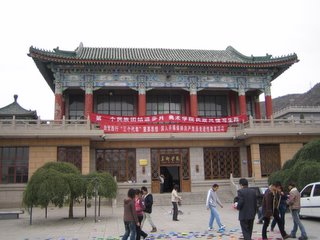
After lunch, Joe Huo and I drove toward the outskirts of Lanzhou and headed up a hillside.
“So what kind of school is this?” I asked, as we passed by a guard gate entrance to a familiar complex of large buildings.
“This is the Lanzhou Minority University. This is set up in particular for the various minorities of China, particularly those nearby to our northwestern city.” There were students here from the Hui Muslim minority, from Inner and Outer Mongolia, and Tibet.
Joe told me that I was invited to speak to a class of students who were studying English. It turned out that for most of these students I was the first American they had ever met, and the first native English speaker.
“Good!” I said, “because not only is English my native tongue, but other than “where is the bathroom” and a few other phrases, it’s my ONLY tongue!”
We took a quick walk around campus, as we had arrived a few minutes early. Joe and I discussed the differences between universities in America and China, and found that most of them were minor apart from dating. Joe said parental and college guidelines held that one could not have a boyfriend or girlfriend until age 23. However, he admitted, these guidelines were constantly changed by the younger generation. This was made all too clear by the rambunctious students all around us, many of whom were couples engaged in one of my favorite college pastimes, flirting.
The teacher for our particular class came rushing up to us from the gate, apologizing for being a few minutes late. Joe and I greeted her in a similar fashion, as she was very easy on the eyes. She was closer to our age than the students’, and was dressed in a stunning Chinese jacket adorned with silk embroidery of autumn rust hues.
She led us up several floors of stairs, taking them with ease, leaving Joe and I a bit winded.
The classroom could hold perhaps 40 students, but there were not that many there at the time.
I was introduced, and warned to speak slowly as the students were not proficient. I didn’t mind. I was just happy to speak to young people. I so much enjoy passionate people, and college students, their hearts filled to the brim with optimism and a fiery passion for life, give me such hope for the future.
As expected, the conversation started out very one-sided. However, I could see that most of the students held their lips pursed tight, and their hands tightly folded on their desk with their necks craned upwards. They were anxious to speak.
So I broke out a bag of candy I had brought with me from the States, and told them to take some. That seemed to break the ice.
One by one, the students started to ask questions. They started out simple and textbook: “what do you think of Lanzhou?” and “why are you here?” and “we welcome you to Lanzhou”. As I responded, the crowd grew a little more relaxed, and the questions began to vary.
We talked about soccer, and the differences between the American definitions of “soccer” and “football”. We talked about English, and the proper way to learn it and speak it. One student asked if there should be an emphasis on English grammar, or on verbal English? It was an excellent question.
But still, I was a bit disappointed.
Finally, a student from Tibet broke into territory that made me smile. He asked, “So… what do you think about President Bush?”
Politics and college students! Hurray!
With that subject breached, we launched into an array of hot topics, such as religion and government involvement in everyday life. Even Joe Huo, my Communist Party friend, had to smile at the familiar debates and concerns of these passionate college students. Joe and I later agreed that our time for such activism was over, and we were both happy to see the young generation anxious to change the world.
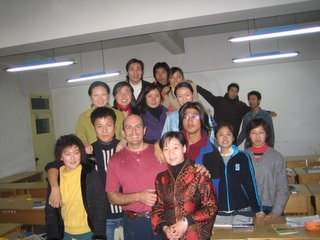 I had such a wonderful time, and Joe and the teacher were gracious enough to let the discussion go on well past our deadline. In fact, Joe was kind enough to make a call to postpone our dinner plans.
I had such a wonderful time, and Joe and the teacher were gracious enough to let the discussion go on well past our deadline. In fact, Joe was kind enough to make a call to postpone our dinner plans.The only unfortunate result of this was the loss of my voice. The change in atmosphere and the excited talk with these vibrant students had taken a toll upon my vocal chords. FortunatelyI was still able to use my voice until bedtime that night.
The students were very appreciative of my visit, and welcomed me to return to Lanzhou in the near future. We took lots of pictures together, and I thanked the teacher for the opportunity to speak.
Joe and I had a very nice final dinner together that evening, and I told him how thankful I was to have found such a wonderful friend. He and I compared notes, and I told him that I would be in touch with him soon via email. I had to leave early the next morning for the airport, and unfortunately he would not be able to accompany me.
With a big handshake and hug, I was again happy to say “so long”, but not “good bye”.
The next morning I met with Joe’s colleague, who was my guide on the previous day to see the waterwheels of Lanzhou. She was very distressed to hear me speak, as all I could manage was a series of barely audible croaking. Try as I might to assure her that it was just damaged vocal chords, she recommended medicines, throat soothers, warm clothing, and even a hospital visit. She was very apologetic, but I told her that she had nothing to apologize for, that I had been pushing myself a bit too hard over the last few days. When Joe called me on the cellphone, he also barraged me with concerns and recommendations for my croaking voice. I managed a “thanks again Joe!” as I left Lanzhou, bound for Changchun, and my next and final mission for the children of China.
For now.
The Lanzhou Mosque - 2
The Imam and his staff were genuinely interested in my humanitarian effort, and told me that they, too were involved in many charities in the community. They had most recently sent large contributions to Pakistan, hard hit by devastating earthquakes.
I then suggested to my hosts that I could record whatever message they would like to the Muslims of the Orlando community. Switching effortlessly into Arabic, the Imam, as well as his staff extended a greeting via my camcorder.
The Imam and his staff then took a few photos with me, and asked me if I wanted to take a tour of the Mosque, as well as take a look at the
school located on the mosque grounds.
“Kids?! Are you kidding? I’m there!” I enthusiastically agreed.
At first we ascended the steps towards the main circular onion domed mosque that dominated the landscape. The Imam, who had already had some difficulty moving around using his cane, stayed behind in his offices. I asked his young aide if it was okay for me to enter, given the fact that I was not Muslim. He told me, “you are welcome here”. I was humbled and honored.
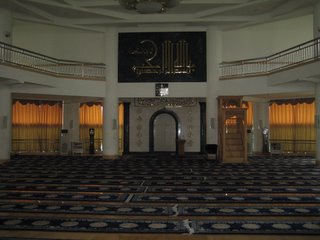 We took off our shoes and I entered with the rest of our entourage. It was clear that the exterior shape of the mosque dome was indeed just a shell for the interior arena. There was very little in the way of support beams or interfering structure inside the dome, save for an upper level balcony. The high vaulted ceiling gave me that familiar sense of awe that I feel whenever entering into a large church hall. The acoustics corresponded to the magnificence of the surroundings. Even our whispers could be heard at great distance.
We took off our shoes and I entered with the rest of our entourage. It was clear that the exterior shape of the mosque dome was indeed just a shell for the interior arena. There was very little in the way of support beams or interfering structure inside the dome, save for an upper level balcony. The high vaulted ceiling gave me that familiar sense of awe that I feel whenever entering into a large church hall. The acoustics corresponded to the magnificence of the surroundings. Even our whispers could be heard at great distance.
Prayer rugs were laid in neat rows from one side of the hall to the other. All were facing the central altar.
The junior aide asked me if I would like to hear a formal greeting from XiGuan Mosque. I told him I would be honored. He bid me to come to the front of the room, near the altar, but I felt odd in doing this. I settled down in the center and raised my camcorder, expecting to hear another introduction in spoken Arabic.
The young man took a meditative position in front of me, and knelt down on his knees. He asked me if I was ready. I said yes.
A moment of silence followed, and you could hear a pin drop. Then his voice boomed out and filled the room in the lyrical chant of spoken Arabic prayer. The dome served as an amplifier, and the hairs on my neck stood on edge at the magnificence of his vocal abilities. I tried to keep the camera steady as his voice permeated my very bones, his face taut with spiritual intensity and concentration. With a small sway, he kept time to some well practiced metronome.
When at last he finished, the vibrations of his prayers were still ringing in my ears. My knuckles were white on the camera, and I realized I hadn’t taken a breath in a long time. He was staring at me, and I remained stunned, until I at last said, “that… was… one of the most amazing things I have EVER experienced. THANK you.”
He only slightly smiled, indicating that this is an everyday practice. This was something that was thoroughly impressive for me, however.
Still awed by the performance, I was led outside to the lower levels of the mosque complex, where I was shown a few classrooms. This was my first experience with Chinese teaching facilities outside of orphanages. I was thoroughly impressed. The organization and skill of the teachers were apparent, even though I could not understand the language.
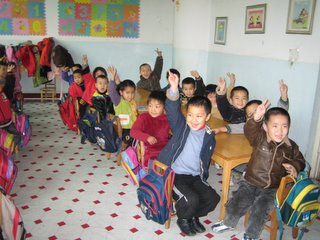 All the children were orderly and obedient, although not rigid. I was welcomed into a kindergarten class, where it was clear from the look on the students faces that I was a disruption. Curiosity quickly overtook them, though, and they edged closer to get a better look or to shake my hand. There were lots of smiles, and lots of giggling.
All the children were orderly and obedient, although not rigid. I was welcomed into a kindergarten class, where it was clear from the look on the students faces that I was a disruption. Curiosity quickly overtook them, though, and they edged closer to get a better look or to shake my hand. There were lots of smiles, and lots of giggling.
I could have stayed there all day, but I wanted to be respectful of the teacher’s control of the class, and I didn’t want to be too much of an interruption of her lessons. I got up and moved backward toward the door where the entourage awaited me. I felt very guilty leaving the teacher with the chaos of 30 children now chattering away about the “foreigner”. However, with a single barked syllable from the teacher, the students INSTANTANEOUSLY quieted, lept to their seats and sat perfectly still.
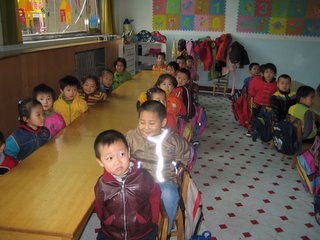 To be honest, I actually recoiled in fear and yelped a bit myself at this action, which caused some of the students, in turn, to be a bit afraid. The teacher looked at me puzzled, along with the other staff members at the door.
To be honest, I actually recoiled in fear and yelped a bit myself at this action, which caused some of the students, in turn, to be a bit afraid. The teacher looked at me puzzled, along with the other staff members at the door.
“I’m sorry” I said, “I’ve NEVER seen anything like this before. I know it’s been a while since I’ve seen a kindergarten class, but I’d be hard pressed to find students who can snap to attention THIS quickly back where I come from.”
The story was the same in the other classes we visited. With a single command, the students sat ramrod straight, although not in a robot-like or fear-induced way. It just looked like this was the way they behaved on a day to day basis. In a few classes the teacher had the class recite their practiced English phrases. Again I wondered how many kindergarten classes in America were able to repeat Chinese phrases.
Blown away by the model behavior of the children in class after class, I was led to another building filled with classes of young women. The classes were teaching Arabic, Chinese, Koran study, and singing.
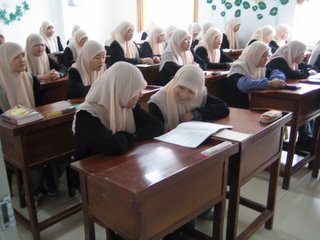
Again I was impressed with the discipline and order of the classrooms.
When we finally met to say goodbye, I thanked the members of the Muslim delegation for giving up so much of their time to meet with me. They mentioned that they welcomed me or anyone else from America to come and visit them in peace. As a farewell, they presented me with an absolutely beautiful calligraphy painting to present to the local Orlando mosque. I told them it would be an honor for me to do so.
I then suggested to my hosts that I could record whatever message they would like to the Muslims of the Orlando community. Switching effortlessly into Arabic, the Imam, as well as his staff extended a greeting via my camcorder.
The Imam and his staff then took a few photos with me, and asked me if I wanted to take a tour of the Mosque, as well as take a look at the
school located on the mosque grounds.
“Kids?! Are you kidding? I’m there!” I enthusiastically agreed.
At first we ascended the steps towards the main circular onion domed mosque that dominated the landscape. The Imam, who had already had some difficulty moving around using his cane, stayed behind in his offices. I asked his young aide if it was okay for me to enter, given the fact that I was not Muslim. He told me, “you are welcome here”. I was humbled and honored.
 We took off our shoes and I entered with the rest of our entourage. It was clear that the exterior shape of the mosque dome was indeed just a shell for the interior arena. There was very little in the way of support beams or interfering structure inside the dome, save for an upper level balcony. The high vaulted ceiling gave me that familiar sense of awe that I feel whenever entering into a large church hall. The acoustics corresponded to the magnificence of the surroundings. Even our whispers could be heard at great distance.
We took off our shoes and I entered with the rest of our entourage. It was clear that the exterior shape of the mosque dome was indeed just a shell for the interior arena. There was very little in the way of support beams or interfering structure inside the dome, save for an upper level balcony. The high vaulted ceiling gave me that familiar sense of awe that I feel whenever entering into a large church hall. The acoustics corresponded to the magnificence of the surroundings. Even our whispers could be heard at great distance.Prayer rugs were laid in neat rows from one side of the hall to the other. All were facing the central altar.
The junior aide asked me if I would like to hear a formal greeting from XiGuan Mosque. I told him I would be honored. He bid me to come to the front of the room, near the altar, but I felt odd in doing this. I settled down in the center and raised my camcorder, expecting to hear another introduction in spoken Arabic.
The young man took a meditative position in front of me, and knelt down on his knees. He asked me if I was ready. I said yes.
A moment of silence followed, and you could hear a pin drop. Then his voice boomed out and filled the room in the lyrical chant of spoken Arabic prayer. The dome served as an amplifier, and the hairs on my neck stood on edge at the magnificence of his vocal abilities. I tried to keep the camera steady as his voice permeated my very bones, his face taut with spiritual intensity and concentration. With a small sway, he kept time to some well practiced metronome.
When at last he finished, the vibrations of his prayers were still ringing in my ears. My knuckles were white on the camera, and I realized I hadn’t taken a breath in a long time. He was staring at me, and I remained stunned, until I at last said, “that… was… one of the most amazing things I have EVER experienced. THANK you.”
He only slightly smiled, indicating that this is an everyday practice. This was something that was thoroughly impressive for me, however.
Still awed by the performance, I was led outside to the lower levels of the mosque complex, where I was shown a few classrooms. This was my first experience with Chinese teaching facilities outside of orphanages. I was thoroughly impressed. The organization and skill of the teachers were apparent, even though I could not understand the language.
 All the children were orderly and obedient, although not rigid. I was welcomed into a kindergarten class, where it was clear from the look on the students faces that I was a disruption. Curiosity quickly overtook them, though, and they edged closer to get a better look or to shake my hand. There were lots of smiles, and lots of giggling.
All the children were orderly and obedient, although not rigid. I was welcomed into a kindergarten class, where it was clear from the look on the students faces that I was a disruption. Curiosity quickly overtook them, though, and they edged closer to get a better look or to shake my hand. There were lots of smiles, and lots of giggling.I could have stayed there all day, but I wanted to be respectful of the teacher’s control of the class, and I didn’t want to be too much of an interruption of her lessons. I got up and moved backward toward the door where the entourage awaited me. I felt very guilty leaving the teacher with the chaos of 30 children now chattering away about the “foreigner”. However, with a single barked syllable from the teacher, the students INSTANTANEOUSLY quieted, lept to their seats and sat perfectly still.
 To be honest, I actually recoiled in fear and yelped a bit myself at this action, which caused some of the students, in turn, to be a bit afraid. The teacher looked at me puzzled, along with the other staff members at the door.
To be honest, I actually recoiled in fear and yelped a bit myself at this action, which caused some of the students, in turn, to be a bit afraid. The teacher looked at me puzzled, along with the other staff members at the door.“I’m sorry” I said, “I’ve NEVER seen anything like this before. I know it’s been a while since I’ve seen a kindergarten class, but I’d be hard pressed to find students who can snap to attention THIS quickly back where I come from.”
The story was the same in the other classes we visited. With a single command, the students sat ramrod straight, although not in a robot-like or fear-induced way. It just looked like this was the way they behaved on a day to day basis. In a few classes the teacher had the class recite their practiced English phrases. Again I wondered how many kindergarten classes in America were able to repeat Chinese phrases.
Blown away by the model behavior of the children in class after class, I was led to another building filled with classes of young women. The classes were teaching Arabic, Chinese, Koran study, and singing.

Again I was impressed with the discipline and order of the classrooms.
When we finally met to say goodbye, I thanked the members of the Muslim delegation for giving up so much of their time to meet with me. They mentioned that they welcomed me or anyone else from America to come and visit them in peace. As a farewell, they presented me with an absolutely beautiful calligraphy painting to present to the local Orlando mosque. I told them it would be an honor for me to do so.
Lanzhou - looking for peace - the Mosque experience - 1
The very selfish part of me wanted to be with the children in the orphanage the whole time. However, I know this is short-sighted. As much as I just wanted to hold the children, comfort them, and have them comfort me, I had to remind myself to focus upon the long term. I think it is very easy, as a parent, to get caught up in searching for answers to those difficult questions we have about our children, or else, those questions that we think our children will come to ask one day.
I cringe when I think about my dear daughters grasping for answers I can't provide.
Being in China, I had a burning personal desire to seek out all those "whys", "hows", and "whats".
Each time I get close to the gates of an orphanage, a familiar feeling rises up in my stomach. One of them is anger. I have so many things to be mad at - anger for the orphanage for not holding my daughters the way they like to be held, for a society that would leave abandonment as the only option for a mother, and for a system that keeps wonderful children cooped up in orphanages long after the point where they could be adopted by eager, loving parents. These are very personal thoughts, and I realize the causes and solutions are very complex, and that no sane person in the world has any desire to harm children.
Then there are more philosophical levels of anger. I get angry at the color of my skin and the shape of my eyes, for I wish they matched my children's. I am angry at birthparents I don't even know, because they were responsible for my child's birth, when I wish so passionately that it could have been me who conceived my daughters.
As the gates or doors of the orphanage close behind me, my heart beats faster. This is no ordinary building, no ordinary set of rooms. This is Holy ground. This is a place of intense mystery and intense pain. While I may be casually walking through the hallway, with the window permitting a bright sun to illuminate lazy bits of dust suspended in the air, if I close my eyes I am blinded by a maelstrom of energy. This place is filled with prayers, with pain, with loneliness, and with voices crying for each other in the darkness. When I enter a room with children, in my soul I am a frightened sailor far from land, stumbling upon the deck of a small ship caught a howling hurricane.
I tread steadily to the source of all that I know about my family, and then I find myself looking into the eyes of a child, and find myself asking THEM the question, "why". It is at this point that I am confronted with my own selfishness.
It is wholly unfair to have a child in an orphanage comfort ME. How dare I, in the midst of my searching for answers, impose any more discomfort to a child already afloat in a raging dark stormy sea?
I know now my quest for answers leads elsewhere. Moreover, my daughters, if I am so lucky, must first INVITE me to search for answers, if they so choose to do so.
As hard as it was to battle the distractions brought by my "kid-itis", I was determined to have eyes for the future. Other souls would continue this effort, and I wanted to leave them a clearer path. I strived to make a good impression upon as many people as possible and strengthen the lines of communication.
Joe Huo and I had this in mind on my last day in Lanzhou.
Before I had left for China, I had read that Gansu province had a large concentration of the Chinese Muslim minority, the Hui. In preparation I had visited the Orlando mosque, where I spoke to Mr. Bassem Chabaan, who runs "The Center for Peace". This outreach center serves as an open forum for understanding between Orlando's Muslims and the rest of the community.
Mr. Chaaban loaned me a book on the history of Islam in China, and told me that he would be very interested to hear a report upon my return. I said that I would be happy to do so, and asked if I could have a letter from the Center of Peace that I could present to a member of the Lanzhou Muslim community, should I have the opportunity to meet with them.
As it so happened, Mr. Huo was kind enough to arrange a meeting with the head mosque of Gansu province, which was located in Lanzhou, the province capital.
So on Wednesday morning, Joe Huo and I met with the members of the local Islamic council. I had expected that this would be a wonderful opportunity for the increasing of understanding and peace in our world community.
What an incredible experience I was in for.
Zipping off from the hotel in the morning, Joe told me that our destination was the most famous mosque in town. The Xi Guan mosque dated back to the reign of Hongwu (1368-1398). It has been rebuilt or refurbished many times, first in 1684, and most recently in 1986.

The guilded lettering over the entrance was the first thing I noticed as we parked in front of this huge white structure. They were written first in Chinese, then in Arabic, and finally in English: "XIGUAN MOSQUE OF LANZHOU"
Twin minarets, covered in shiny white porcelain tiles, pierced the sky. The mosque itself was not as high as the skyscrapers around it, but the regal spirituality of the curved onion dome of the mosque outshone the utilitarian rectangular secular
 buildings beside it. It looked to be a haven for the soul, in a world being swallowed by construction and civilization. I am a suburbanite, and the artistic and religious architecture was a welcome draw from the concrete jungle of neon advertisements and the unimaginative rectangular buildings replicated as far as the eye could see.
buildings beside it. It looked to be a haven for the soul, in a world being swallowed by construction and civilization. I am a suburbanite, and the artistic and religious architecture was a welcome draw from the concrete jungle of neon advertisements and the unimaginative rectangular buildings replicated as far as the eye could see.The courtyard of the mosque was a further image of serenity: the sounds of traffic were muted, and the centerpiece held a very large oak tree, its base below courtyard level. A circular opening around the tree showed only the trunk, and the roots could only be viewed from the opening's edge, looking down at the ground a few feet below.
We were greeted as dignitaries, as we were greeted by a local party member, who was Muslim, and then led into a room where we were presented to the head Imam.
The head Imam, Mr. Yunus Yang Sen, carried the following title:
The Deputy to the National People's Congress
The Commissioner of Islamic Association of China
The President of Islamic Association of Gansu
The Imam of the Xiguan Mosque of Lanzhou.

He indeed looked to be all these things, and more. The 85 year old Imam looked to be as wise as he looked kind. He greeted us with a broad smile, and invited us to sit. As it was Ramadan, he apologized for not being able to offer us any tea or food, as this would violate the fast of the holy month.
I must admit I felt a bit intimidated by the very formal reception. I felt unworthy of such pomp. But I did my best to represent Packages of Hope, my community, and my country in delivering a message of peace and warm greetings to the Hui people of Lanzhou.
The friendly imam, a short white beard carefully manicured from his chin, returned the greeting of peace.

Although I knew some arabic words from my time working in Saudia Arabia, I told the Imam that I was not Muslim. Without hesitation he told me that people of all faiths were welcome here in peace.
Communication - the Key to success
On the way back from the orphanage, Joe Huo reiterated something to me that I really agreed with.
He and I were both really concerned with making the world a better place.
Whether because of our similar age, or because of our similar goals, we really saw eye to eye on the concept of communication.
He said:"communication is the earth in which understanding can grow".
He knew, like I did, that for growth, for anything positive to arise, you must communicate. This is perhaps the singular most difficult thing that humans grapple with. Whether between nations, or between family, communication is necessary for problem resolution, and paves the way for understanding and peace.
Amen!
He and I were both really concerned with making the world a better place.
Whether because of our similar age, or because of our similar goals, we really saw eye to eye on the concept of communication.
He said:"communication is the earth in which understanding can grow".
He knew, like I did, that for growth, for anything positive to arise, you must communicate. This is perhaps the singular most difficult thing that humans grapple with. Whether between nations, or between family, communication is necessary for problem resolution, and paves the way for understanding and peace.
Amen!
Lanzhou - SWI - needs
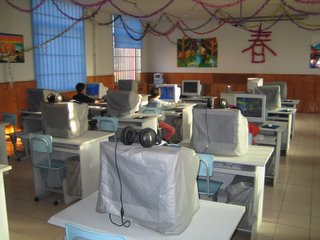
Madam De then took me to another building where I saw something I have never seen in any orphanage in China - a computer lab! There were 20 workstations, which were donations made from a local raffle. When I entered, there were 2 special needs older children playing learning games at the terminals.
Madam De led us to her office, on the way explaining that the orphanage was being refurbished, and that the elderly residents of the SWI were being relocated to a nearby facility, and that this location was to be used exclusively for children. She mentioned that the needs here were great for basic equipment for a growing orphan population.
As we were outside, she pointed to the location where there would be a large library (apparently they had a few books), and where there was a rehabilitation exercise room. I did not visit these rooms.
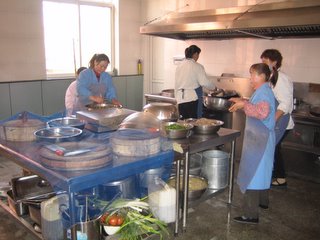 She showed us around the kitchen and cafeteria rooms, which were very nice and clean. She mentioned that the government provision for every child was clearly not enough to provide for all the basic needs of the children.
She showed us around the kitchen and cafeteria rooms, which were very nice and clean. She mentioned that the government provision for every child was clearly not enough to provide for all the basic needs of the children.When we were in her office, I asked her about the basic needs requested for the orphanage. She mentioned that there was a need for a refrigerator (which costs around 1500RMB), and washing machines. She mentioned that several small washing machines were needed, but that if the donation was large enough, a large industrial sized washer would cover the needs for the entire orphanage. Small washers cost around (1,000 RMB - around $130), but a large industrial washer costs 15,000 RMB ($1,875).
She also mentioned that there was a need for Airconditioning units, which are used for heating as well as cooling, which cost around 2,000 to 3,000 RMB ($250 to $375).
She mentioned that the library could use more books, and requested that the books be informative, telling about the outside world, and be educational, rather than just storybooks.
She also mentioned that there were needs for more TVs and DVDs.
We also told her that we represented an organization - Love Without Boundaries, that provided for surgeries for special needs children. Madam De was going to provide a list for Mr. Huo so we could pass this information along to Love Without Boundaries.
She thanked us profusely for our visit, for in a very short time we became welcome friends. I again told her that I hoped that we could do more in the future for the Lanzhou orphanage children.
FYI - I wanted to post the one-sheet description I was given for the Lanzhou SWI:
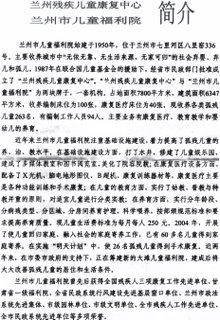
Here's the English translation:
A Brief Introduction of
Lanzhou Disabled Children Recuperation Center
Lanzhou Social Welfare Institute
Founded in 1950 and located at 336 Baliyao Street, Qi-Li-He District of Lanzhou, Lanzhou Social Welfare Institute serves as a haven for abandoned children and orphans who “have nobody to rely on, have no incomes and are homeless”. Assisted by United Nations Children’s Foundation, approved by the city authority, Lanzhou Disabled Children Recuperation Center was established in 1987. The two organizations actually are operated by the same staff. With 263 children living on the campus and 94 staff working there, the location occupies 7800 square meters with 6346 square meters under roof. It has a capacity of 100 beds for orphans and 40 beds for recuperation. Its major business includes recuperation, education and infant caring.
Last a few years, LSWI focuses on basic facility construction to promote the ability to support recuperate and educate disabled children. The construction job done includes, a new well, a kid’s playground, a multimedia classroom and a library. New equipment bought includes an X-ray machine, an electroencephalogram machine, a ultrasonic B machine and some specific recuperation equipments. LSWI paid equal attention to pre-K and standard education as well as special needs of the children. For nutrition and caring, following the guidance of the government regulation, LSWI divides the children in to groups based on their age and type of disability, puts them into different rooms. The current living standard is RMB 250 Yuan/month/child. The campaign of “Letting kids merge into families and society” started in 2004, up to now; over 60 children have found foster homes. 26 disabled orphans have gotten the chance of surgical operations as the benefit of implementation of “Tomorrow Plan”. Supported by the government, a new site called Datan Children Welfare Institute now is under construction, upon finish, the living standard of the disabled orphans will be much better.
LSWI was awarded by the central government as Advanced Institute in three areas of disabled recuperation. It also dubbed as The First Class welfare Institute by the provincial government of Gansu. It also awarded many times by the local government in various areas.
Lanzhou Disabled Children Recuperation Center
Lanzhou Social Welfare Institute
Founded in 1950 and located at 336 Baliyao Street, Qi-Li-He District of Lanzhou, Lanzhou Social Welfare Institute serves as a haven for abandoned children and orphans who “have nobody to rely on, have no incomes and are homeless”. Assisted by United Nations Children’s Foundation, approved by the city authority, Lanzhou Disabled Children Recuperation Center was established in 1987. The two organizations actually are operated by the same staff. With 263 children living on the campus and 94 staff working there, the location occupies 7800 square meters with 6346 square meters under roof. It has a capacity of 100 beds for orphans and 40 beds for recuperation. Its major business includes recuperation, education and infant caring.
Last a few years, LSWI focuses on basic facility construction to promote the ability to support recuperate and educate disabled children. The construction job done includes, a new well, a kid’s playground, a multimedia classroom and a library. New equipment bought includes an X-ray machine, an electroencephalogram machine, a ultrasonic B machine and some specific recuperation equipments. LSWI paid equal attention to pre-K and standard education as well as special needs of the children. For nutrition and caring, following the guidance of the government regulation, LSWI divides the children in to groups based on their age and type of disability, puts them into different rooms. The current living standard is RMB 250 Yuan/month/child. The campaign of “Letting kids merge into families and society” started in 2004, up to now; over 60 children have found foster homes. 26 disabled orphans have gotten the chance of surgical operations as the benefit of implementation of “Tomorrow Plan”. Supported by the government, a new site called Datan Children Welfare Institute now is under construction, upon finish, the living standard of the disabled orphans will be much better.
LSWI was awarded by the central government as Advanced Institute in three areas of disabled recuperation. It also dubbed as The First Class welfare Institute by the provincial government of Gansu. It also awarded many times by the local government in various areas.
Wednesday, November 02, 2005
Lanzhou SWI - Pictures
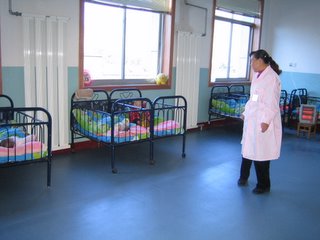
here's a view of the inside of the Lanzhou SWI.
Below is some of the cute kids!
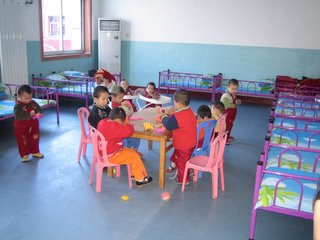
Below is us at the Lanzhou SWI. At the right is my wonderful foreign affairs liaison, Joe Huo. 2nd from the right is Madam De, the orphanage director.
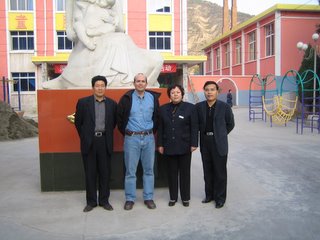
The below was taken on the way back from the orphanage. I just HAD to include this one. What I want to know is,
1. How did he get going on his bike
2. Somebody better be at his destination when he plans to stop!

